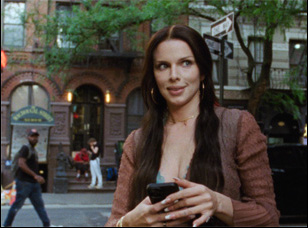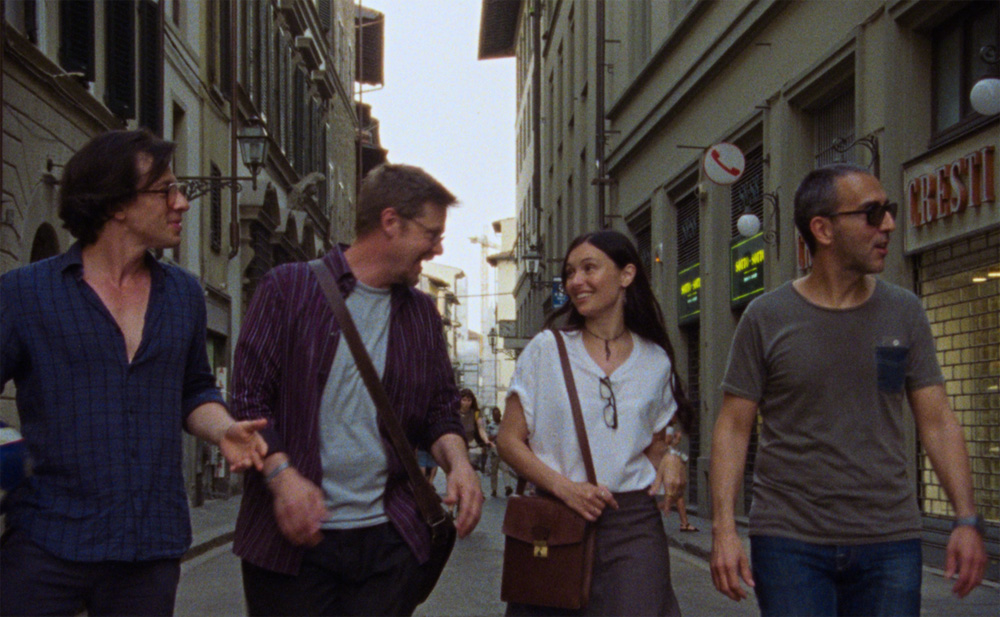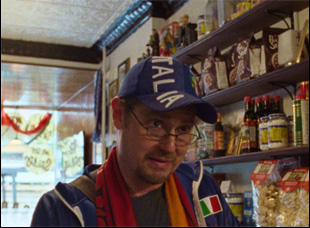As “Fior de Latte” wears on, it increasingly seems like the worst thing that could’ve happened to Mark Von Bloom (Tim Heidecker) was to get a taste of Italy when he continues to lust after the week he spent in Tuscany well after he’s returned to his cramped apartment in New York. He has his head in the clouds by nature, devoting both time and money to searching for memorabilia from old Hollywood online, getting as much a high from potentially placing a winning bid on a kimono once worn by Mickey Rooney as the various scents he seeks out from old clothes to conjure memories or more potent chemicals, and professionally, he uses his imagination as a playwright, though it appears he’s reached a dead end with his latest script. Italy may have been inspiring, but when he remains decked out in loud, touristy clothing he picked up abroad and brought with him a girlfriend (Marta Pozzan) who appears far less interested in him upon seeing him in his natural habitat than when he was first in her neck of the woods, it looks like he may be trapped between two worlds forever as he struggles to find his footing back in New York.
While Mark is tortured by being caught between the life he has and his fantasies, writer/director Charlotte Ercoli brings out the best of both worlds in her dazzling directorial debut, envisioning New York as a place where in fact those experiences can live side by side and occasionally even intersect. From a stupendous opening in which a trip to an ice cream parlor leads to full song-and-dance number to eventually ending up in a Wonka-esque perfumery in the back of your standard storefront run by a maestro of both certain scents and classical music as a composer (Kevin Kline), the film can convey the grip that Mark’s flights of fancy have on him when they’re so enrapturing as part of the film and poignantly acknowledges from its title on how there are two ways to see the world when “Fior de Latte” may sound more elegant and exotic in another language, but ultimately it is vanilla in plain English.
Naturally with its bow at Tribeca this week, Ercoli was busy making sure New York audiences in particular would get to feel that magic upon walking into the screening where they might be spritzed with some of the perfume that was actually made for the film and in the midst of preparing for the premiere, she graciously took the time to talk about how she first conceived of such an inventive musical comedy, filming on two continents as a scrappy independent production and learning to make music – and perfume – from scratch to create an utter original.
To be honest, it was the easiest thing for me to write that I could have written because it was all just taken from personal experiences and congealed into one thing, smashed together. I was actually writing a different script that was inspired by the Jerry Lewis and Sammy Petrillo story, and I found I was laboring over this other script and I needed a palate cleanser, so just as an experiment, I started writing this and it just seemed like the most obvious thing for me to write. I had been pushing it aside and then it just flowed and I finished it in a couple of weeks.
Because it takes place in two countries, was that immediately part of this?
It was all an elaborate design for me to get my film over back to Italy, which is where my father is from and where I had a very important experience as a teenager, so Mark’s experience in the movie is based off of my own.
Were you able to shoot that part of the Italian part of the film first, so the cast could have that memory?
I wish, because that would have been a smarter thing to do, but we did it right in the middle of everything. We shot for a week in New York, then we shot only two-and-a-half days in Italy. It was so fast. And then we flew straight back and shot the rest with Kevin Kline as the perfumer because it took a while for that set piece to to be built and to design it and choreograph [the scene].
That set is amazing. What did it take to build?
I’m not sure if you’re familiar with the cartoonist Rube Goldberg, but I love Rube Goldberg machines and I and also Rowland Emmett, who did all of the machinery for “Chitty Chitty Bang Bang.” I really wanted something that felt in that world, but grounded in reality and I worked with one of the best New York [production designers] Madeline Sadowski, on building that. I had animatics of what I thought it would look like and the choreography that would be in the song and it was just a lot of drawing and talking and more drawing and sketching out this scene and animating it. It was quite a process, but it was so much fun and she knocked it out of the park.
There’s an early scene where Mark is pitching his play to someone and you’re able to see a few pages from it, but it looks like it really was fleshed out. Did you actually develop a full production proposal of this fake play?
It was actually all taken from my notes in my journal of unfinished ideas — those are all things that I wrote. Most of them are my drawings as well. I think there’s one Owen Klein original drawing in there, and it’s all unfinished gibberish, but real ideas of mine from from a long time ago.
I was tantalized by every page. And Mark’s surroundings say a lot about him. What was it like creating his apartment?
Yeah, I thought that it was appropriate that a man that is addicted to huffing perfume and his own memories would also be a collector of old show business memorabilia. That just fell hand in hand in a perfect way and I was very specific about the things that I wanted. To be honest, Mark’s character is heavily tied into my own interests. I’m a huge fan of old movies, cartoons, and just showbiz history in general. A lot of those objects actually were mine. And if they weren’t mine, they were things that I specifically sourced with Madeline Sadowski. I just knew that he would have them, and also maybe they were things that I secretly wanted to keep for myself.
Dare I ask, were there any props that you could keep that were really special?
Well, I actually have it on me right now. The hat that [Mark] wears in the movie I wear every day. I didn’t steal anything else from the production. That would have been wrong.
How did Tim Heidecker come to mind for this part?
I can’t imagine anybody else but Tim. I’ve been a huge fan of him for a really long time, but it wasn’t until I started watching “On Cinema,” and there is a naivete and a sincerity that he delivers on that show that I just thought he needs to have a dramatic role that really does justice to what a great actor he is. He just seemed perfect and when I offered it to him, by some sort of miracle he accepted. We have some mutual friends, so I think he needed to have some people vouch for me and see if I was crazy, if I was a nice person and I was vouched for and he was able to do it.

There are so many things that on a day-to-day basis that you just have to go with the flow and constant problem solving. But if you read the original script, there was much more of Italy in the original script and it became a smaller part of the movie and more of an idea and a hazy memory as opposed to really being inserted into that and living that experience with [Mark]. It feels more like a true flashback now in the way that the movie ended up being and monopolizes much less time.
The whole film has that dreamy quality to it, in part because of the editing. Was that a fun part of the process?
Oh, yeah, it absolutely was. I had to get really creative with that because I wanted to really sell the idea that he did have the best time ever [in Italy]. And originally, there was so much more to Italy. I really wanted people to feel like they were there with them and for it to have a hyperrealism quality to it in comparison to New York where it’s magical and there’s singing and it’s a manifestation of his projection of what he wants life to be. Just because of time constraints, I had to sell the idea that he had the best time ever in two days worth of shooting [in Italy], so that was like the biggest surprise and hurdle for me. But it was so much fun to play with. I was really worried about it during production, but ended up having more than enough footage to sell that idea.
Music in general is such a great part of accentuating what’s going on. What was it like to put together?
I spent so much time writing this music and it’s funny because the reason why I got into making music in the first place was so I had something to shoot and edit footage to. I didn’t feel comfortable when I was a teenager taking other people’s music, so out of filmmaking necessity, I decided to just take up messing around with a keyboard and saxophone and bass and all that jazz. I’m not classically trained or really a good musician by any means. And I spent about five months educating myself on how perfume is made of iris flower, [figuring out] where do these ingredients come from and how are they treated with chemicals to make a perfume. And how do I want to tell this through a song?
I spent so much time before pre-production just getting a handle on these songs because I knew it was going to be such an important piece in the film. Something that I hate more than anything is when people write original songs in movies and I feel like they do a half-assed job, almost making a mockery of the musical and I just really wanted these songs to be sincere and beautiful and true. I also wanted perfumers to watch the film and think, “Oh, this person actually kind of knows what they’re talking about a little bit.” Some of it is totally made up for the fun and magic of it being a movie, but I really tried to do my research on these songs and spend as much time as possible, then by the time I had them written and demoed with me singing them, I had my string arranger, Andy Street, help me bring them to life with more of an orchestral background. It really came to life once we had Kevin [Kline] singing on it and Michael Townsend [who plays an ice cream man] has a beautiful song in the movie too that I’m equally proud of.
You mentioned Jerry Lewis and there’s definitely a bit of Frank Tashlin, his frequent collaborator, in this – that rigorous attention to detail in the service of something so silly. Was he an influence?
Well, I love Frank Tashlin and I love his cartoon consciousness. He goes down as my favorite director of all time and I’m a huge Jerry Lewis fan. “Artist and Models” is a movie that I am so inspired by and just everything about it. I love the gag writing in that and that’s why I wanted Mark’s character to be a Frank Tashlin-esque gag writer in the movie and just implement little Tashlin-esque moments into the film to explore his point of view. And then in Italy, I wanted none of that. I wanted it to feel really raw and based in reality.
You pulled it off. Now that you’ve got this wonderful film on your hands, what’s it like to send out into the world?
It feels like a miracle. I’m so happy and I feel so lucky that I got to make a movie. I’ve been begging people to let me make a feature for my entire life. And for some reason, this just happened overnight, it feels and I’m in disbelief. It’s been something that exists in my mind for a year-and-a-half and now it’s about to go out into the world, so I’m just really grateful and happy. Honestly, if everybody out there hates the movie, I don’t care. People can do that. I got to make a movie. Joke’s on you. [laughs]
“Fior di Latte” will screen at the Tribeca Festival at the Village East on June 10th at 8:45 pm and June 14th at 8:45 pm and the AMC 19th St. East 6 on June 15th at 6 pm.





